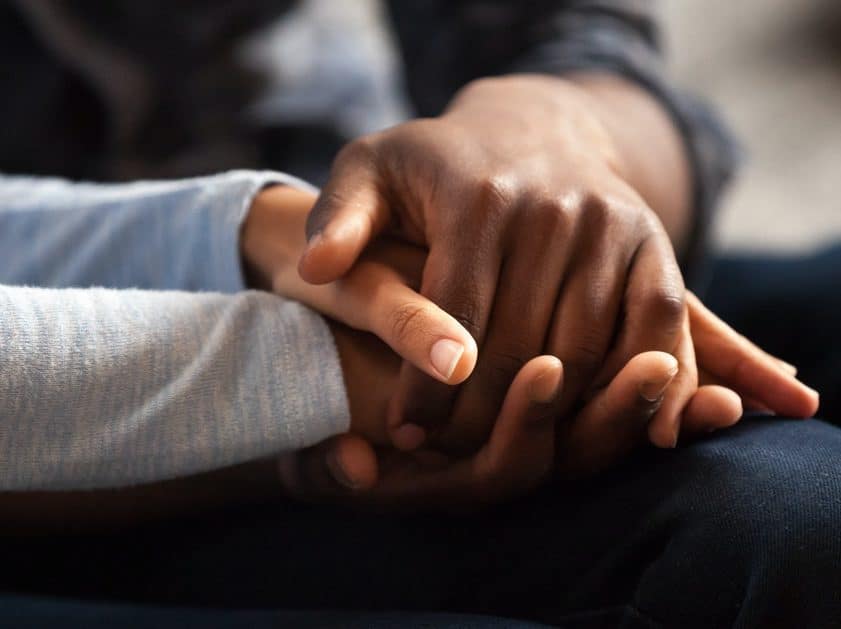- In these truly unprecedented times, it’s more important than ever to support struggling friends
- But it’s equally crucial to make sure that you’re not jeopardising your own mental health in the process
- Here’s how to support your friends during lockdown while still protecting your own feelings

It’s no secret or surprise that lockdown has been challenging. A 2020 survey conducted by Mind found that 65 percent of adult participants with a pre-existing mental health problem felt that their mental health got worse over lockdown, while recent ONS figures have shown that almost 1 in 5 adults are experiencing some form of depression due to the ongoing pandemic.
If you know someone who’s struggling a lot due to lockdown, it can sometimes be hard to know what to do. It’s easy to say that you’re ‘there for someone’ – but how can you ‘be there for someone’ in a pandemic?
How to reach out
The first thing to do is reach out. You could ask your friend when they’re free for a FaceTime if you’d rather have a good, long chat – but a simple text asking ‘How are you doing?’ wouldn’t go amiss either.
If you live close, another option is inviting your friend to go on a walk together. This is a great option, given that fresh air is always beneficial to mental wellbeing and that face-to-face conversation often flows more naturally than exchanges over text; although sadly this isn’t an option for everyone at the moment.

Often, if someone is having a hard time, they might try to change the subject, so as to avoid talking about any painful emotions. It’s important not to force them to open up: therapist Yvette Addo tells HuffPost that pushing too hard can “be counter-effective and could lead to them feeling pressured, with less autonomy, causing the feeling that they are unable to speak for themselves.”
But you can encourage them to open up by asking other questions such as ‘what have you been up to?’ and ‘how is work going?’, which might lead into a chat about their wellbeing more naturally. Most importantly: don’t be weird. Approaching the situation with too much formality will likely make your friend feel uncomfortable and even more unwilling to share how they’re feeling.

“There is no need to act differently. As things change daily, the stability of your friendship in the form it has always taken could be of utmost importance,” Addo tells HuffPost. “Act as you usually do together. Behaving differently can make someone feel more isolated.”
What to say (or not to say)
It can be hard to know what to say to someone who is in a lot of emotional pain – but sometimes, the most important thing you can do is listen. Christi-an Slomka, mindful movement teacher and community manager at Calm, tells Metro: “Practice being totally present. Acknowledge their feelings. Avoid pat phrases like ‘you’ll get through this’ or ‘you’re okay.’ Thank them for sharing them with you.”

Speaking to Stylist, Niels Eék, psychologist and co-founder of mental wellbeing and self-development platform Remente, adds that “it can sometimes be difficult to understand why someone feels anxious, depressed, or stressed about certain things.” Eék explains that really, listening with a non-judgemental ear is the best thing you can do.
Unless it is genuinely helpful and relevant, avoid talking about yourself or comparing your friend’s situation to your own. Eék adds that it’s also important not to trivialise or downplay your friend’s feelings: “As you listen, do not conclude the conversation by saying ‘it will be okay’ or ‘stop worrying’.”

“The vast majority of sufferers know that their fears and worries are irrational, but they don’t need you to tell them this again and again. Instead, just listen to them, and reinforce the fact that you are there to help them,” he says.
What to do
Whether you need to take further action or do anything else following a conversation depends on the state of your friend’s mental health. Perhaps they just needed a one-off vent and feel much better after sharing their anxieties with you. Perhaps they’d feel comforted if you two had a weekly FaceTime. Or perhaps they’re in need of further assistance.

Maybe they’re already in contact with a GP – if so, you can check in every so often to ask how that’s going. Essentially, anything practical you can do to make their life easier is a good place to start: picking up groceries, offering to clean their house (if you live together or if they’re part of your support bubble), or dropping off some food you’ve made for them are all great ways of helping a friend through a difficult time.
Of course, sending along a huge bouquet of flowers or an elaborate present is a surefire way to cheer anyone up, but if you’re dealing with a depressed person, little things will arguably have a bigger impact.

However, if they’re really suffering and have not been in touch with a GP, try and encourage them to do so. Sometimes struggling people may be reluctant to seek help – perhaps they’re in denial about their situation and feel as though they’d be wasting NHS time; perhaps they’re ashamed to reach out – but it’s essential to talk to a professional if poor mental health persists.
Talk to your friend about any anxieties they might have about seeking professional advice and do your best to reassure and support them. If you are able to, it might be worth offering to come with them to their first appointment.
Set boundaries
It’s important to set boundaries when helping a friend. “You can play a really valuable role in supporting someone you care about through the pandemic, but remember you’re not solely responsible for fixing things or offering advice,” Emma Carrington, advice and information service manager at Rethink Mental Illness, tells HuffPost. “The most important thing you can do is to listen to them, show them that you care and that you’re taking their concerns seriously.”

If you’re beginning to feel like you’re struggling to cope with your friend’s struggles, have a chat with them. Dr. Kalanit Ben-Ari tells Stylist: “have a sincere conversation about the situation and explain that you have reached your limit with everything going on. Speaking openly and honestly will not only make sense to your friend, but in the long run it will bring you closer together.”
Acknowledge you can only do so much
At the end of the day – you’re a friend, not a psychologist. You can’t get to the root of why your friend feels the way they feel. Beyond staying home and taking the necessary precautions, you also don’t have the power to make the pandemic end any faster.

When you care a lot about a person, it can be hard to accept that you can’t ‘save’ or ‘fix’ them. But if you try to take on too much responsibility, it’s likely your own mental health will deteriorate too. In some ways, being a good friend means knowing your limits. Because you can’t be there for them as effectively or robustly if your wellbeing is suffering too.

